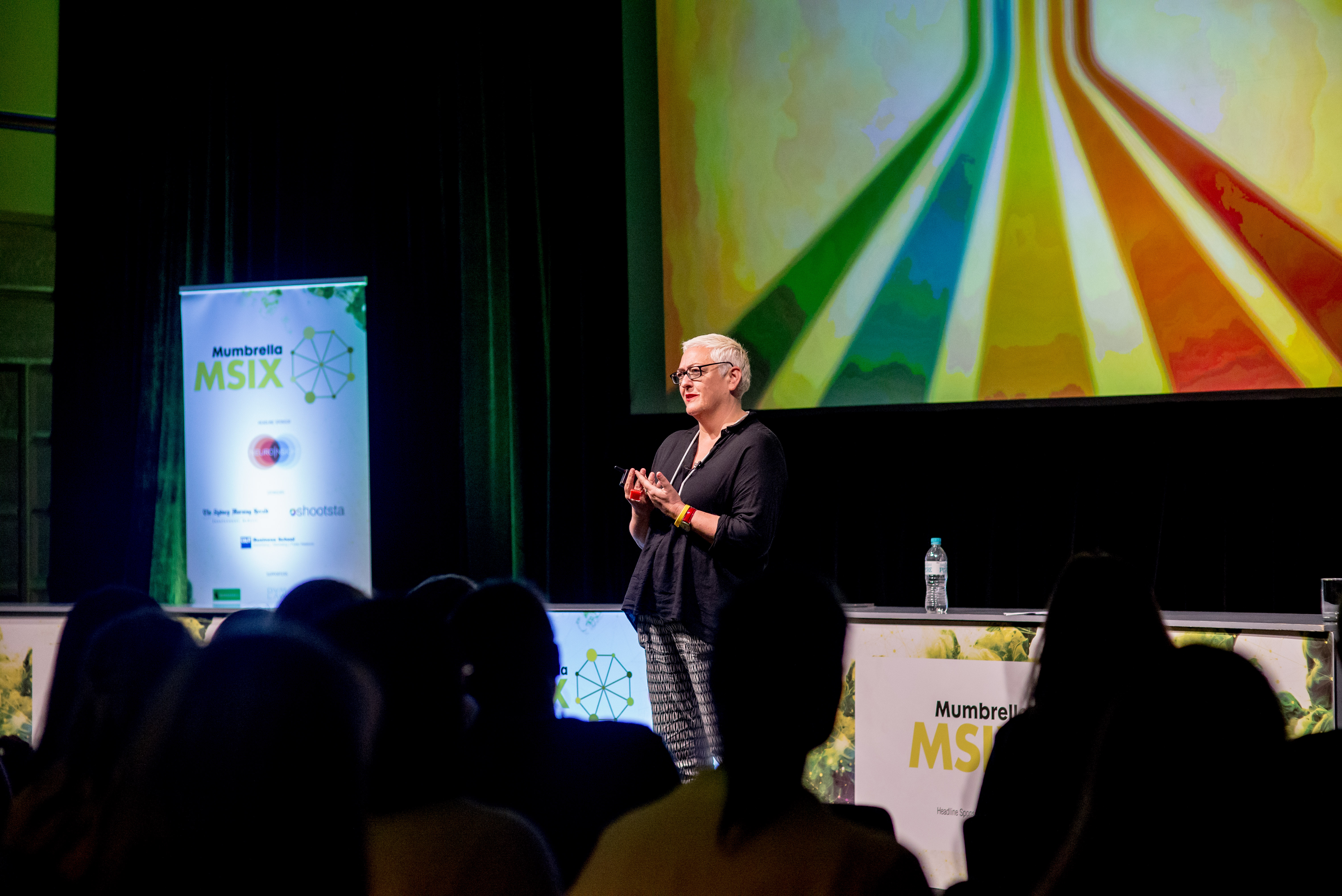Screen industry’s ‘criminal network’ of men needs to be dismantled, researcher suggests
The Australian screen industry puts too much emphasis on data about women and doesn’t focus enough on what men are doing to prop up the patriarchy, the associate dean of engagement and innovation at the University of Technology Sydney (UTS) Deb Verhoeven has argued at Mumbrella’s MSIX conference.
While discussing the lack of female participation and inclusion in the screen and research sectors, Verhoeven also questioned why industries wait until women have been harmed to examine male dominance.
“If we can see the shape of patriarchy, maybe we can prevent it,” she said in reference to visualisations of data which showed male producers who only worked with men or employed a noticeable minority of women.
“Why do we wait for the traumatic experiences of women who have to leave organisations? Or be silenced? Or be bought out with NDAs [non-disclosure agreements]? Or suffer actual harm before we recognise the problem? Why do we wait for that? Why don’t we use the diagnostic tools at our disposal to identify the men who are the problem – the gender offenders – before they create a problem? Because we can do that.”
She said there was a research and reporting bias which focused on what women were doing, instead of how men contributed to, and benefited from, the problem.
“Why do we keep releasing data about women? Why don’t we release data about men? Why don’t we study their behaviours? Because they’re the beneficiaries of the system. So it stands to reason that the beneficiaries of the system are creating a system that benefits them,” she said.
Verhoeven also noted the screen industry’s solutions thus far – development funding, mentoring, “lean in” and a special fund for women working with women – weren’t working, largely because they missed the point.
“[When Screen Australia had a special fund for women working with women] that was the point at which I went ‘No, we’re looking at the wrong problem’. Women actually – we know through the data – don’t have a problem working with other women. The problem is not women working with women. The problem is men won’t work with women. Women are not the problem to be solved in the film industry. Men are. Why aren’t we looking at data about men?,” she said.
“So that’s what I did. I started to look at men.”
Her research, which covered a 10-year period, discovered 41% of male producers only work with men and never women. The average size for a creative team in the Australian film industry is four, but 75% of male producers work with “a minority of women” – that is, zero to one women on the team, Verhoeven said.
“75% of male producers, three quarters of the industry of male producers, only work with zero to one women. How many times was that woman a director? Once – and she was brought in by the French distribution company. Not one single Australian female director worked with 75% of male producers in the Australian film industry in a 10-year period.
“This is what we should be studying.”
The solution, she suggested, was to approach the patriarchy in the screen industry as law enforcement would look at criminal networks and terrorism cells.
“If I know that data has a power, how do I change that? Instead of using data to stop women from feeling confident or comfortable participating in an industry, how can I use data instead to think through what happens for men in this industry?
“Who does that? Who actually uses data like that? I can tell you who: anti-terrorism agents and the police. And they use this thing called ‘criminal network analysis’ to break up drug cartels or terrorist cells. What would happen if we thought of the film industry as a drug cartel?”
She said data could be used to “break up the network” and identify the perpetrators – “the men that need to be taken out”.
“Only 16% of women get to be directors in the Australian film industry. Nobody takes responsibility for their own behaviour. That’s a terrible statistic. [But too many men think] ‘I’m a guy. I think I’m pretty good. I like women. It’s not about me, that 16%.’ [Using data] we can actually identify who it is about, because we know their names.”
Verhoeven noted the power data (such as Screen Australia’s report into female participation) had to influence circumstances – women will see the low participation rates and be less inclined to participate, assuming it is a hostile environment, not based on merit.
The problem will continue, she said, until the patriarchy is reshaped, the “gender offenders” removed and the focus shifts to men’s role in the industry’s bias.







… and the Harvey Weinstein of the Australian advertising industry is….
User ID not verified.
This was one of the best presentations at MSIX. Rigorous, compelling. Deb had the room in the palm of her hand.
We’re all thinking it aren’t we?
Australian media companies and creative agencies. Notorious boys clubs. Full of Harvey Weinsteins.
Deb Verhoeven, meet Cindy Gallop. The drinks are on me.
Make mine a gin.
User ID not verified.
This talk by Deb was great… But have you read Byron Sharp’s book?
Seriously though, what a horrendous performance by a ‘keynote speaker’
Total disregard for anyone else, going 45 minutes over time, rambling on about nothing and demanding that people ‘read his book’ whenever they have a legitimate question!
Not to mention the farce that was the sycophantic behaviour on display by the curator.
#BoycottByron
User ID not verified.
When is this self interest going to stop? Lets look at some recent figures – 2017 AIDC (Australian International Documentary Conference) women made up 52% of speakers, 61% of funding decision makers and 56% of all delegates. As of 30 June 2016 workplace gender statistics at Screen Australia are 77.23% female and only 22.27% male.
User ID not verified.
Most of the people in the room were women. Where is the problem in our industry?
User ID not verified.
Insightful perspective in understanding the conditions which conspire to keep women’s voices marginal. There is a strong track record in Australia of female producers encouraging and commissioning work from other women as directors and writers. But it’s much more difficult for male producers to recognise stories and perspectives generated by women; the stats do not lie.
User ID not verified.
Hank, one room does not determine the state of an entire industry.
It’s people like you that are holding women back. Grow a pair and listen.
User ID not verified.
No one is holding women back … look at Mark’s comment. Unbiased stats don’t lie
SMH
User ID not verified.
Yes, Mark’s comment highlights some statistics that prove there has been some sort of improvement in gender equality in the industry. In documentary and within the Screen Australia workplace… that’s great, But they do not reflect women in leading creative roles in film (drama especially) as the article refers to… meaning female Directors, Cinematographers, Editors Writers and Producers….
User ID not verified.
Hi “Shakes Head”. Your response to Hank intrigues me? What exactly are you referring to when you say “grow a pair”? Are you saying that if I don’t have a pair of whatever you mean, or am unable to grow them, then I’m incapable of understanding what Deb Verhoeven is on about?
If that’s the case then could that be considered an effort on your part to exclude some of us who can’t grow this pair of whatever, from gaining an insight into what is a real problem for our screen & media industry? And secondly, if you said this in your workplace to a colleague, would this comment be considered a touch on the aggressive side; perhaps even sitting on the edge of bullying zone? Are you a closet bully? If we are going to have a constructive dialogue about what is a pressing and (depressingly real) issue, such language is really not going to advance the argument for change and shift old-thinking among our counterparts and colleagues. Whatever pair you may think you need to to grow, is really not a solution. Perhaps the only thing we need to grow is a united voice calling for change and a revolution in thinking as to who should be able (and support to) create, tell, present and deliver our stories to audiences. Can I suggest that maybe your response to Hank is part of the problem, that being, it comes from a time and approach that is rooted in old-world thinking that is ultimately ruinous of advancement and real change.
User ID not verified.
Excellent. Happy to be introduced. Also happy to drink 🙂
User ID not verified.
yes the system stinks…
the way i was treated as a up and coming actress in the 1990s in the australia film/theatre/ad industry world was like a piece of meat. most of the teenage starlets i worked lived with where passed around,promised the world… the directors liked the more impressionable the girl the better
as mentioned 90% the directors/producers/ tech jobs were for the boys.
the so brilliant jane camption/jill bilcock.liz mullinar etc where the exceptions,
why arent they speaking up naming names.? naming the sleazy,predatory males in the melb/syd film/entertainment industry – actors,directors,casting creeps and the rest.
nb: props to the majority good guys but lets name the bad
User ID not verified.